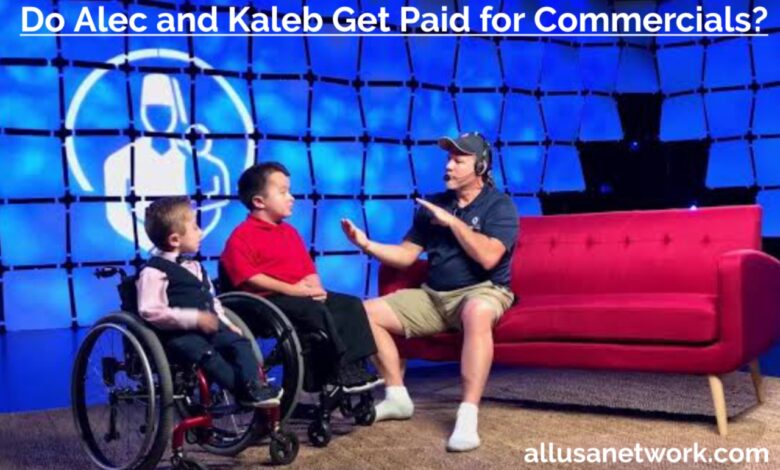Do Alec and Kaleb Get Paid for Commercials

Alec Cabacungan and Kaleb-Wolf De Melo Torres are known for their appearances in the Shriners Hospitals for Children commercials, which have garnered widespread attention. Both boys have become household names through their engaging personalities and compelling stories. However, many viewers wonder whether Alec and Kaleb are paid for their work in these commercials. This article will explore the specifics of how children like Alec and Kaleb contribute to commercials, the ethical considerations surrounding their participation, and whether they receive compensation for their appearances.
Who Are Alec and Kaleb?
Alec Cabacungan and Kaleb-Wolf De Melo Torres are two children who have become the faces of the Shriners Hospitals for Children commercials. Alec, who has brittle bone disease, and Kaleb, who was born with osteogenesis imperfecta, have been featured prominently in the hospital’s marketing efforts, sharing their personal stories to help raise awareness and funds for the hospitals’ efforts.
Alec became widely recognized after he began appearing in Shriners commercials in 2014, while Kaleb followed soon after. Both boys represent patients who have benefited from the healthcare services provided by Shriners Hospitals, which specialize in treating children with orthopedic conditions, spinal cord injuries, burns, and cleft lip and palate.
The commercials typically feature Alec and Kaleb encouraging viewers to donate to the cause, with their heartfelt stories underscoring the value of the hospital’s charitable work. Their charisma and the sincerity of their message have made them influential advocates for Shriners Hospitals. But does their role in these commercials come with financial compensation?
Understanding How Commercials Work
In the world of television and online advertising, compensation for actors and spokespersons is the norm. Generally, those who appear in commercials, whether they are professional actors or real people sharing their personal experiences, are paid for their participation. The amount of payment depends on several factors, including the person’s role, their fame, and the reach of the commercial. Compensation can come in the form of flat fees, royalties, or residuals depending on the contract.
Commercial actors are often represented by agents, who negotiate their pay and ensure that contracts are in compliance with legal guidelines regarding minors. Additionally, children who appear in commercials are typically subject to the same labor laws that protect child actors, ensuring that they are compensated fairly for their work.
Given Alec and Kaleb’s consistent and high-profile appearances, it’s reasonable for viewers to ask if they are compensated similarly to professional actors or if their participation in these commercials is strictly volunteer-based. Let’s take a deeper look.
Do Alec and Kaleb Get Paid for Their Appearances?
The answer to whether Alec and Kaleb get paid for appearing in Shriners commercials is not straightforward, as financial details are typically not made public. Shriners Hospitals for Children operates as a non-profit organization, and many participants in non-profit marketing campaigns volunteer their time to help promote the cause.
However, being part of a non-profit does not necessarily exclude compensation. It is entirely possible that Alec and Kaleb receive payment for their time and efforts, particularly considering the amount of work involved in shooting and promoting the commercials. Given the time commitment, travel, and emotional labor involved, compensating these children and their families would align with industry standards for similar work.
Additionally, if Alec and Kaleb are paid, they could be receiving compensation in various forms, including payments to their families, scholarships for their education, or donations to support their ongoing medical care. Compensation, if given, might not always come in the form of direct cash payments but could instead be structured in a way that benefits the children’s futures or their families.
Ethical Considerations in Child Participation
Whether Alec and Kaleb are paid for their commercials raises important ethical questions about the participation of children in fundraising and advertising campaigns. When children are used as spokespersons for charities or organizations, especially when they are patients of those organizations, several considerations must be taken into account:
- Informed Consent: It’s critical that children and their families fully understand the role they are playing in the commercials and that they are given the opportunity to consent to their participation. This includes being aware of how the commercials will be used and whether their appearances are being monetized.
- Compensation and Fair Pay: If children are taking on a significant role in a commercial, it is important to ensure that they are fairly compensated for their time and effort. This is especially true when the child’s story is being used to generate donations or revenue for the organization. If Alec and Kaleb are compensated, it would align with the principle of fair pay for work done.
- Emotional Impact: Appearing in commercials, particularly those with an emotional appeal, can be taxing for children, especially when they are sharing personal details about their health. It’s important for the organization to provide emotional support to the children involved and ensure that their participation does not have negative psychological effects.
- Representation of Disability: Alec and Kaleb’s appearances in these commercials also raise important questions about the representation of children with disabilities in media. Are their stories being told in a way that empowers them, or are they being used as symbols to evoke pity and donations? It’s crucial that organizations like Shriners Hospitals are mindful of how they portray children with disabilities, ensuring that their stories are handled with dignity and respect.
The Role of Charitable Organizations in Marketing
Shriners Hospitals for Children is a well-known charitable organization that relies heavily on donations to fund its operations. The commercials featuring Alec and Kaleb play a critical role in driving public awareness and fundraising efforts. However, as with all charitable organizations, there is a delicate balance between marketing for donations and ensuring that the people featured in those marketing campaigns are treated fairly and ethically.
Many charitable organizations use real people to share their stories, and it’s a common practice to feature the voices of those directly impacted by the cause. These stories are powerful because they humanize the mission and allow viewers to connect emotionally with the cause. However, the use of children, particularly those with serious medical conditions, requires additional care and consideration.
It’s important for organizations to be transparent about the ways in which participants are compensated or otherwise supported. While many people volunteer their time and stories for charitable organizations out of a genuine desire to give back, it is also appropriate for these organizations to ensure that participants, especially children, are recognized and rewarded for their contributions.
Legal Protections for Child Actors
In many countries, there are laws in place to protect child actors and ensure that they are fairly compensated for their work. In the United States, for example, the Coogan Law requires that a portion of a child actor’s earnings be placed in a trust that can only be accessed when the child reaches adulthood. This law was enacted after a famous case in which a child actor’s earnings were mismanaged by his parents, leaving him penniless as an adult.
If Alec and Kaleb are being paid for their work in Shriners commercials, they would likely be protected under similar laws. This would ensure that any earnings are safeguarded for their future, providing financial stability as they grow older. It’s worth noting that even if Alec and Kaleb’s participation is voluntary, these protections are important in safeguarding their long-term interests.
How Non-Profits Approach Compensation
Non-profit organizations like Shriners Hospitals for Children often rely on the goodwill of volunteers and donors to carry out their missions. In many cases, people who appear in marketing campaigns for non-profits do so without expectation of financial compensation. However, this is not always the case, and non-profits may choose to compensate individuals for their time, especially if their participation requires significant effort or involves extensive travel.
The fact that Alec and Kaleb are regular fixtures in Shriners commercials suggests that their involvement may go beyond what is typically expected of a volunteer. Given the frequency of their appearances and the likely time commitment involved, it would not be surprising if the hospital chose to compensate them in some way.
It’s also possible that any compensation Alec and Kaleb receive is reinvested into their medical care or educational opportunities, helping to support their long-term well-being.
Conclusion: The Mystery of Alec and Kaleb’s Compensation
While it’s not publicly confirmed whether Alec and Kaleb are paid for their appearances in Shriners Hospitals for Children commercials, it’s clear that their involvement is significant. Their compelling stories have helped raise awareness for the hospital’s mission, and their personalities have endeared them to audiences across the country. Whether they receive financial compensation or volunteer their time, it’s important to recognize the emotional and physical labor involved in their participation.
Ultimately, the question of whether Alec and Kaleb are paid is secondary to the larger ethical considerations surrounding child participation in non-profit marketing. Ensuring that they are treated fairly, supported emotionally, and empowered to share their stories on their own terms is the most important factor in this conversation.
As viewers, it’s essential to appreciate the contributions that Alec and Kaleb make to Shriners’ mission, while also advocating for transparency and fairness in how charitable organizations manage their marketing campaigns. Whether paid or unpaid, Alec and Kaleb’s efforts are invaluable in bringing attention to the life-changing work of Shriners Hospitals for Children.
Read More: www alternativeway.net: Your Guide to a Different Path in Life





